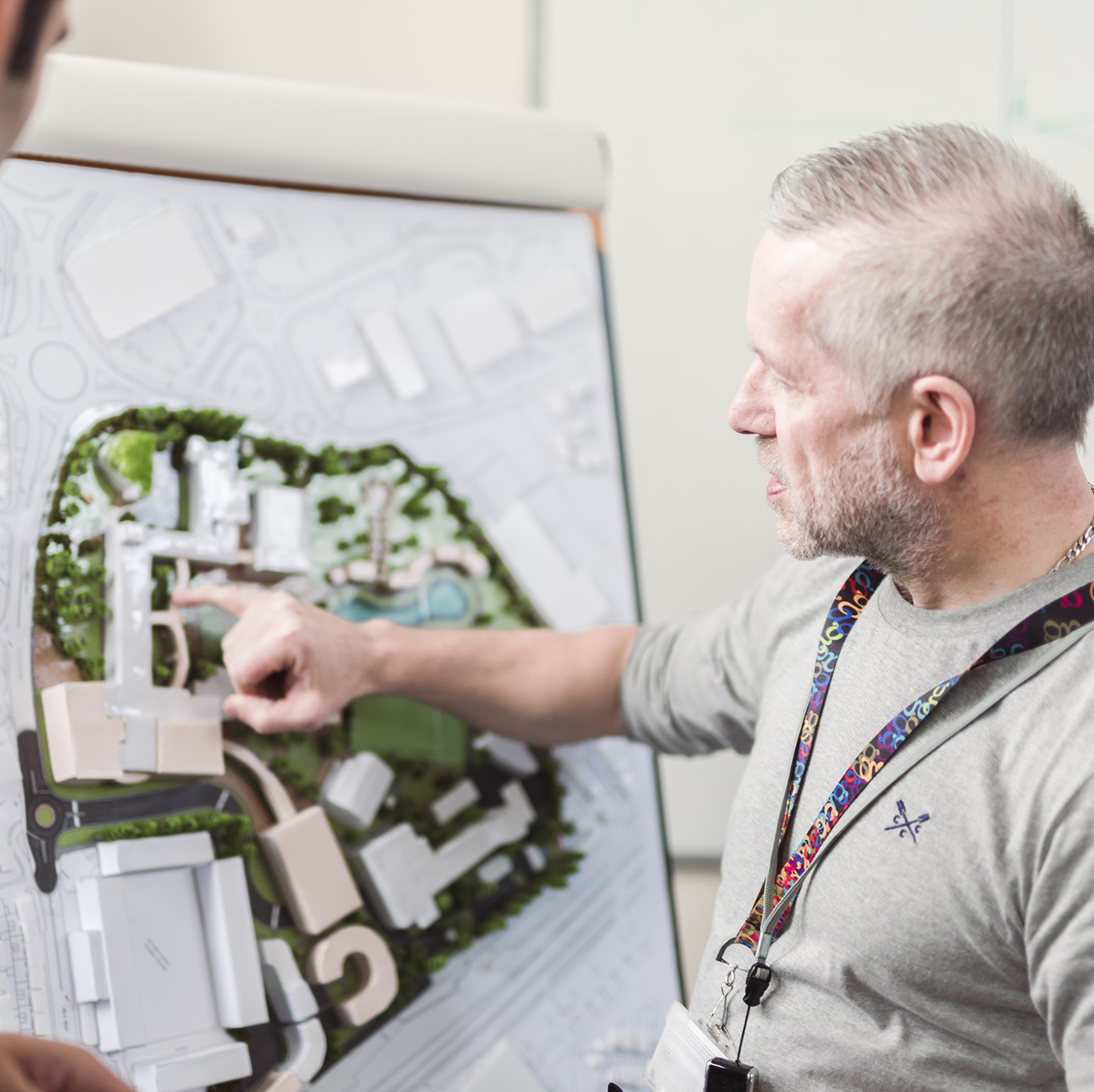HNC Construction Technology

Course details
Year of entry
2026
Duration
1 YR (PT)
Institution Code
G53
Location
Wrexham
Why choose this course?
The construction industry is one of the largest employment sectors in the United Kingdom and requires a constant supply of construction technologists to contribute to building and civil engineering projects of all sizes.
- The Higher National Certificate in Construction Technology is an ideal qualification for those who are currently employed within the industry and are motivated by seeing their hard work rewarded and their expertise recognised within a vibrant and challenging industrial sector.
-
The HNC programme will build upon your existing knowledge of building design and construction processes, and will further-develop your understanding of how projects are created, managed, constructed and operated upon completion.
- Whilst many construction specialists are engaged in the design and construction of new sustainable development projects, many others are responsible for the implementation of heritage and refurbishment projects; often sensitive in nature because of historical or architectural significance, or the traditional quality of the existing fabric. A career in construction can therefore be as diverse or as specialist as you want it to be in pursuing your own personal goals and career ambitions.

Built environmentat Wrexham University
Key course features
- The Higher National Certificate (HNC) Construction Technology programme is completed in just one academic year.
- The course has a combined first year with BSc (Hons) Architectural Design Technology, BSc (Hons) Building Surveying, BSc (Hons) Construction Management and BSc (Hons) Quantity Surveying allowing progression to Level 5 of either of the corresponding titles of the two selected optional modules at the end of Year 1
- Wide-ranging industry-standard digital resources are available for use on- and off-campus such as architectural design software and academic publications
- Further opportunities to directly engage with industry through conferences, guest lectures and visits to live construction projects to observe site operations in practice
- The Built Environment subject area is part of the Faculty of Art, Computing and Engineering (FACE) and therefore content benefits from association with arts, computing, engineering and renewable energy subject disciplines.
As you are employed within the construction sector and intend to study on a part-time basis, please contact the Programme Leader Dr Gareth Carr as funding might well be available through schemes administered by sector skills organisations.
What you will study
The HNC Construction Technology programme comprises six core modules and two optional modules that combine to provide an informed understanding of the range of aesthetic, functional, technical, legal and environmental considerations that contribute to the construction of buildings and infrastructure.
MODULES (LEVEL 4)
- Digital Technologies in Drawing and Modelling (Core)
- Digital Technologies in Surveying (Core)
- Legal Principles, Compliance and Liability (Core)
- Science and Materials (Core)
- Construction Technology (Core)
- Professional Practice 1 (Core)
Choice of two:
- Architectural Design Technology 1 (Optional)
- Building Surveying 1 (Optional)
- Construction Management 1 (Optional)
- Civil Engineering Design (Optional)
- Quantity Surveying 1 (Optional)
The information listed in this section is an overview of the academic content of the programme that will take the form of either core or option modules. Modules are designated as core or option in accordance with professional body requirements and internal academic framework review, so may be subject to change.
Entry requirements & applying
To enrol on the HNC Construction Technology programme, applicants will normally be expected to have previously achieved one of the following as a minimum:
- Successful completion of a Foundation Year at Level 3 in a discipline considered appropriate by the Programme Team; or
- 96-112 UCAS tariff points; or
- a BTEC National Certificate or Diploma; or
- membership of a construction-related professional body at a level deemed appropriate by the programme team.
Applications from candidates who do not satisfy the standard entry criteria identified above are welcome and will be expected to demonstrate through interview that they have the potential to succeed on the programme.
Candidates who have sufficient appropriate experience are also welcome, though diagnostic assessment prior to admission will be considered in order to measure academic capability, particularly in mathematics and English or Welsh.
International applicants whose existing qualifications are outlined by the National Academic Recognition and Information Centre (NARIC) as being equivalent to the relevant UK entry qualification are also welcome. All applicants whose first language is not English or Welsh will be expected to demonstrate English language proficiency; European applicants are able to provide this evidence in a number of ways (please read), including IELTS; International applicants require a UKVI Approved Secure English Language Test (SELT) (please read for details).
All candidates must be appropriately employed on a full-time basis within the construction industry with a facility to attend on a ‘day-release’ basis.
Teaching & Assessment
Modules are delivered using a variety of teaching and learning techniques, including traditional lectures, practical ‘hands-on’ activities, tutorials and group discussions, laboratory work, construction site-based observation and peer appraisal. The main priority is to ensure that you feel comfortable within the academic learning environment and feel able to contribute to the discussion of subject matter within any class, tutorial or other learning activity that forms part of your studies – teaching and learning is fundamentally a two-way process within which your opinion is vitally important.
A range of assessment methods are used within the programme to simulate the sorts of written, practical, visual and oral communication skills that are expected of construction technologists; written reports, the practical use of technical equipment, visual presentations, laboratory analyses, in-class tests, examinations, coursework and oral presentations are all important ways in which you can demonstrate your understanding. The types of assessment selected for each module have been chosen to best-suit the nature of the technical content in each subject, and collectively provide a range of opportunities for you to demonstrate your interest, enthusiasm and interpretation of content during your studies.
In terms of particular assessment needs, the University’s Inclusion Services department can provide appropriate guidance and support should any students require reasonable adjustments to be made to assessment processes because of a recognised prevailing disability, medical condition, or specific learning difference.
Career prospects
The Higher National Certificate in Construction Technology course provides a qualification that is recognised as a comprehensive, informed and valuable measure of understanding in the technologies of construction.
Opportunities for construction technologists exist within the construction industry in many varied contexts, from ‘new-build’ developments to heritage and refurbishment projects of all scales and types – developing a career as a construction technologist can therefore lead to many rewarding experiences, not least due to the fact that no two construction projects are the same, and that construction technologists are likely to spend as much time on site as they are at their desks. These circumstances mean that a career in construction technology can often be challenging, particularly rewarding, but never routine.
The HNC Construction Technology qualification will therefore provide a sound basis upon which to further-develop a career in the technical aspects of construction projects in a range of contexts. Those who successfully complete the programme will establish a sound basis from which to progress within the sector, not least because of the experience and understanding gained whilst following the HNC Construction Technology programme at Wrexham University.
Fees & funding
You do not have to pay your tuition fees upfront.
The fees you pay and the support available will depend on a number of different factors. Full information can be found on our fees & finance pages. You will also find information about what your fees include in the fee FAQs.
All fees are subject to any changes in government policy, view our undergraduate fees.
Accommodation
At Wrexham University, we offer on-campus en-suite rooms within our Wrexham Student Village. These private, fully furnished spaces are conveniently located, providing easy access to campus facilities, study areas, and social spaces. Plus, you’re just a 10-minute walk from the city centre!
With all bills included, free Wi-Fi, 24/7 security, and large social areas, you’ll find everything you need for a great student experience.
Explore our student accommodation options to find your perfect home away from home.
Upcoming Open Days.
Join us at an upcoming open day to meet your lecturers, find out more about our courses, discover our facilities and get a taste of student life.
Browse all of our open days & events.


